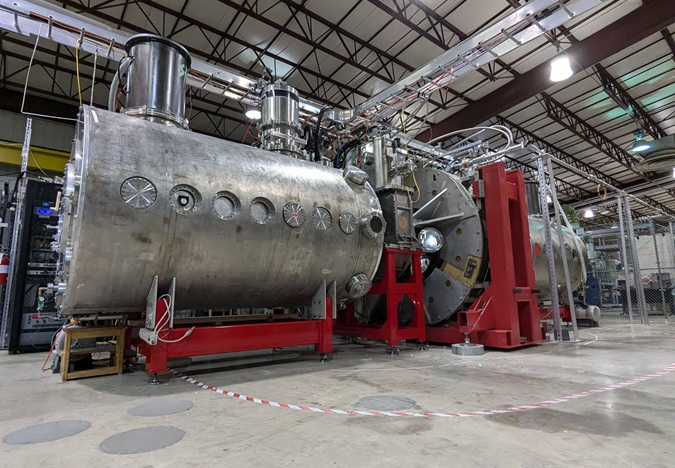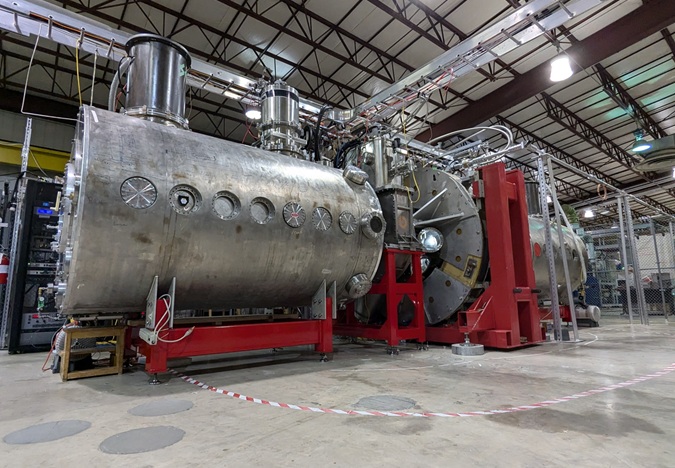
US-based fusion energy start-up Realta Fusion has secured $36 million in Series A funding to accelerate the commercial development of its modular magnetic mirror fusion technology. The funds will be used to advance experimental research, scale up development, and lay the groundwork for a prototype fusion reactor, which the company aims to have operational by 2028.
Founded in 2022 and headquartered in Wisconsin, Realta Fusion is developing a novel, compact approach to fusion energy based on the magnetic mirror concept. This method employs powerful magnetic fields to confine superheated plasma—ionised hydrogen gas—within a cylindrical chamber. Under the right conditions, hydrogen atoms within the plasma collide and fuse, releasing vast amounts of energy without producing greenhouse gas emissions or long-lived radioactive waste. Unlike conventional fission-based nuclear power, fusion does not rely on splitting heavy atoms such as uranium or plutonium, a process that generates dangerous waste and carries a risk of catastrophic meltdown.
Realta aims to pave a lower-cost, less complex path to deployment than traditional fusion initiatives. Its modular system can be scaled to match specific energy demands, potentially serving industries requiring high-temperature heat and reliable electricity. These include data centres, chemical production facilities, metal recycling operations and remote mining sites—sectors typically reliant on fossil fuels for industrial process heating.
“This funding allows us to validate our plasma simulations using real-world experimental data, bringing us dramatically closer to making fusion energy real,” said Realta Fusion CEO Kieran Furlong. “From there we will design a prototype fusion device that is as de-risked as you can get it, before we actually go build it. We aim to have it operating by 2028.”
The Series A round was oversubscribed and led by Silicon Valley-based Future Ventures, an early-stage investor with a track record of supporting breakthrough climate and deep-tech companies. Other contributors included Mayfield, GSBackers, SiteGround, and Avila VC. Existing investors Khosla Ventures, the Wisconsin Alumni Research Foundation, and TitletownTech—a venture fund backed by Microsoft and the Green Bay Packers—also participated.
Future Ventures co-founder Maryanna Saenko said the firm backed Realta for its agile and application-driven approach. “We’re investing early in Realta Fusion because they’re charting a faster, more flexible path to commercial fusion. By focusing on compact magnetic mirror systems, Realta addresses a critical decarbonisation need that larger projects aren’t targeting. It’s a nimble, application-driven strategy that could bring fusion benefits to market sooner.”
Realta’s magnetic mirror research is rooted in plasma physics experiments at the University of Wisconsin–Madison, where an early-stage device is already in operation. The company grew out of a university-led initiative funded by the US Department of Energy’s Advanced Research Projects Agency–Energy ([ARPA-E](https://arpa-e.energy.gov/)), a programme known for supporting transformative energy technologies that are too early for private-sector investment.
The new funds will enable further development of that research and support the establishment of Realta’s own experimental facility, dubbed “The Realta Forge.” The company also plans to expand its team and begin detailed engineering of a prototype fusion energy system. This marks a significant step forward not just for Realta, but for the broader commercial fusion landscape, which has seen increasing momentum in recent years thanks to improving technology and growing interest from both governments and the private sector.
Fusion energy has long been heralded as the “Holy Grail” of clean energy: it uses hydrogen—the most abundant element in the universe—as fuel, and, in theory, can deliver virtually limitless power with negligible environmental impact. While international efforts such as the ITER project in France have demonstrated some success, large-scale fusion power has remained elusive due to the immense technical challenges of maintaining extreme temperatures and pressures over sustained periods.
However, confidence in commercial fusion has grown. In 2022, scientists at the US National Ignition Facility achieved a net energy gain in a fusion reaction for the first time—a key milestone in proving the viability of fusion as a practical energy source ([BBC coverage](https://www.bbc.co.uk/news/science-environment-63950962)).
Realta Fusion joins a growing list of private-sector companies pursuing alternative approaches to fusion, such as [Commonwealth Fusion Systems](https://cfs.energy/) and [TAE Technologies](https://tae.com/), which are experimenting with different configurations of magnetic fields and plasma containment.
As the global push to decarbonise energy systems intensifies, fusion’s promise of clean, reliable, and abundant power continues to attract significant attention. Realta’s compact, modular approach could help realise that promise sooner, particularly in industrial sectors where the transition




